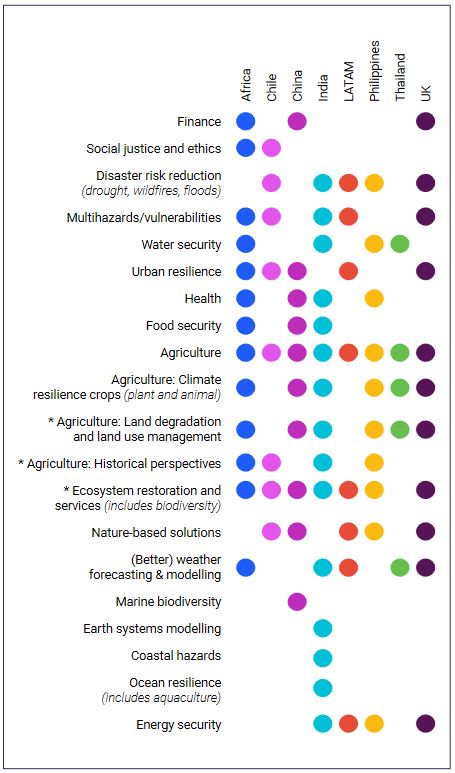In this post, Jonathan Rans, Strategic Research Executive, summarises UKRI’s ‘Tackling Climate Change’ report and discusses opportunities for sharing lessons both from global responses to Covid-19 and between global regions affected by climate change.
On the 16 March, UKRI published its report ‘Tackling climate change: Adaptation and Resilience Opportunities.’
The report distils findings from a series of international events held in the run-up to COP26. These highlight critical issues for climate adaptation and resilience work, providing possible insights into priorities for UKRI funding in this area. There are likely to be opportunities for transferring knowledge across regions of interest and, specifically, learnings around global crisis response gained during the Covid-19 pandemic.
Nine of these events had a specific regional focus, looking at adaptation gaps and priorities that could be met by research. The report presents these organised by seven major regions:
- Africa
- Chile
- China
- India
- Latin America
- Philippines
- Thailand
A further set of events had a thematic focus looking at areas of interest such as:
- Insect Biodiversity
- Oceans and Climate
- Climate and Health
- Plastics and Climate Change
- Towards a Sustainable Earth
The report looks across all of the events, and summarises the critical outcomes. Key findings that arose were:

1. A key action is to adapt learnings from one region to another, the diagram here shows country priority research areas identified through the events. For more detail on individual areas check the UKRI report by region. NB: UKRI recognises these will not be the only opportunities for transfer of regional knowledge and approaches.
2. There are opportunities to transfer lessons learned on global collaboration and coordination from the international response to the Covid-19 pandemic and apply them to the climate crisis.
3. Interdisciplinary research and innovation is critical for developing systems-level understanding of complex climate risks. For guidance on developing your interdisciplinary research projects and career see our Interdisciplinary Toolkit (UoE access only).
4. The development of transdisciplinary research on climate adaptation depends on long-term, sustainable and equitable partnerships across diverse sectors. Improvements in the sharing of data and knowledge are a vital driver.
5. Research needs to be accessible, embedded in the local, non-academic community and ultimately translated into clear messages for policy makers and local populations. Co-creation is particularly important when it comes to the developing measures of success.
If you have transferable knowledge in the areas highlighted by UKRI and are interested in connecting with relevant researchers, contact your research funding specialist.
Find my research funding specialist (UoE access only).
Further information
For further information on the report see the associated UKRI resources:
UKRI compilation video of highlights of the events.



